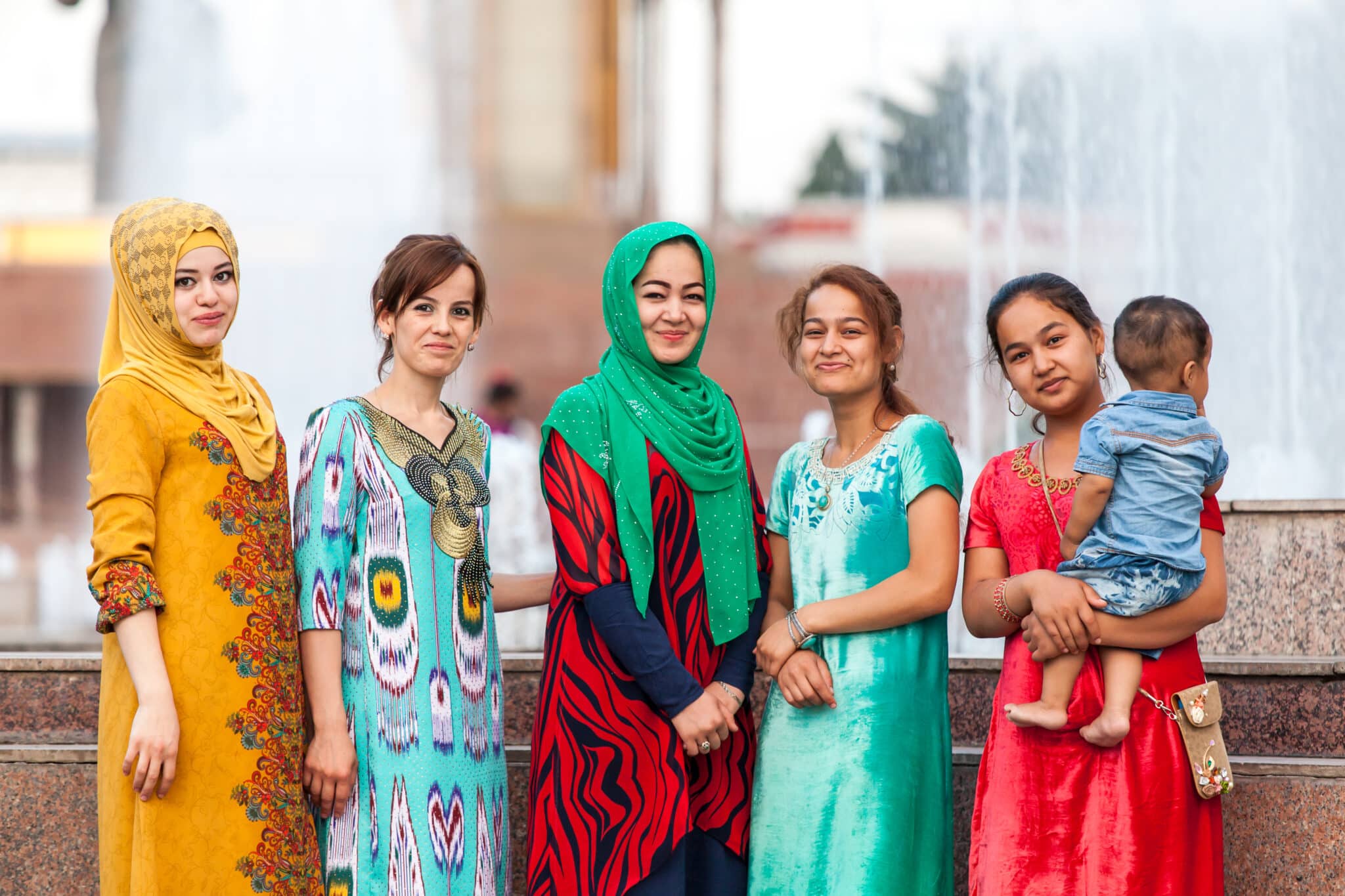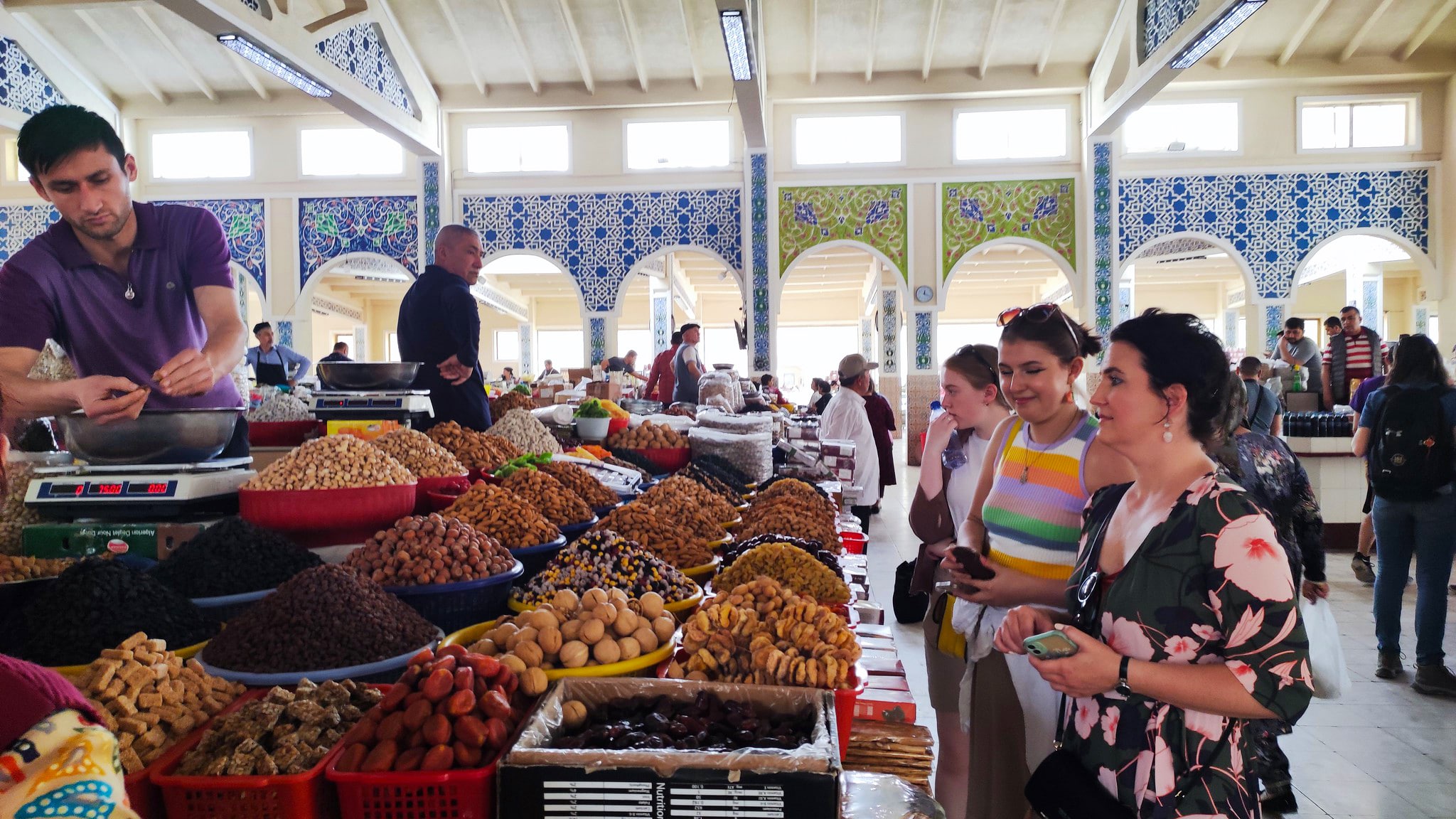The Talking Phrasebook Series presents useful phrases and words in side-by-side translation and with audio files specifically geared to help students work on listening skills and pronunciation. Below, you will find several useful phrases and words. To the left is the English and to the far right is the Tajik translation. Tajik uses a Cyrillic alphabet. Below the Cyrillic, we’ve provided a phonetitc transliteration in Latin script.
In the center column for each row is a play button. The recorded file will feature first English, then the Tajik in three versions: one slow, one with each syllable broken out, and a last version that will be spoken as it might be overheard in a conversation between native speakers.
10 Facts About Tajik
- Status: Tajik is an Iranian language related to Persian. Some argue that Tajik is in fact a dialect of Persian rather than an independent language. However, Tajik has had a unique historical experience, with heavy influence from both Arabic and Russian and is a major component to the Tajik national identity.
- Speakers: Today, Tajik has an estimated 18 million speakers. Approximately 10 million of these live outside of Tajikistan. There is a native minority in Uzbekistan and many other Tajik speakers live throughout other Central Asian countries and Russia. Inside Tajikistan, Russian remains an official “interethnic” language and is still taught in Tajik schools, meaning that many Tajiks are bilingual.
- Foreign Influences: Tajik’s strong Arabic and Russian influence can be seen in the pronunciation of some letters as well as many loan words. Loan words have traditionally held irregular grammatical forms that follow the original Arabic or Russian rules. There is an active effort in Tajikistan, supported by the government, to replace loan words with Tajik equivalents.
- Gender: Tajik has no grammatical gender. The single third-personal singular pronoun “вай” can mean “he,” “she,” or “it.” Another pronoun, “ӯ,” can be used to refer to specifically animate subjects, but can still mean either “he” or “she.” Names of people are typically gender specific and there are ways to gender nouns, but the gender of a noun does not further affect the grammar of the language.
- Adjective Use: In Tajik, adjectives are typically placed after the nouns they modify.
- Showing Respect: To show respect in Tajik, plural forms are used to refer to individuals.
- No Cases: Tajik has no case system and instead relies on prepositions and postpositions to indicate relationships between nouns.
- Simple Pronouns: Because Tajik has no case system, it has only a single set of pronouns: ман (I/me), ту (you), шумо (a polite form of you), ӯ / вай (he/him; she/her; it), мо (we/us); шумоён (a plural form of you), and онҳо (they/them).
- Showing Possession: There are no possessive pronouns in Tajik. Instead, possession is shown by attaching a suffix to the noun that indicates the item owned. For example, if a book is yours, you would attach the suffix -ам to the word for book, китоб, and say “китобам,” which means “my book.” The other suffixes to use are -ат (your), -аш (his/her/its), -амон (our), and ашон (their). There is also a plural form of “your” that is used for second-person groups or to indicate respect for an individual, -атон.
- Diverse Dialects: Tajik has many dialects. Tajik speakers have historically been spread throughout Central Asia, separated by great distances. Tajikistan itself is a country of particularly challenging mountainous geography which has created many isolated communities. Because of this, there are at least four families of dialects spoken within Tajikistan itself. The numerous Tajiks in Uzbekistan and Kyrgyzstan also speak a specific dialect. Also, the Bukharan Jews, although named for a city in Uzbekistan, traditionally speak a dialect of Tajik that has been heavily influenced by Hebrew. The information below represents Tajik as typically spoken in Dushanbe, the capital.
Unique Characters in Tajik
Tajik uses a Cyrillic alphabet similar to Russian, but with several unique characters or pronunciations. These include:
Ғ – This is a Cyrillic “Г” with an extra bar. The Cyrillic “Г” is the equivalent to the English hard “g” sound. Like these letters, “Ғ” is a voiced uvular fricative, but is gently rolled at the back of the throat. The result is something that sound much like a Russian “X” or a very roughly pronounced “GH” from the English word “knight,” but rolled with a quality similar to the pronunciation of “R” in Spanish or French.
Ӣ – is equivalent to the English “EE” as in “feet.” This letter makes the same sound as another Tajik letter, И, but is held slightly longer.
Ӯ – is similar to sound that “U” makes in the word “put,” but is formed from deeper in the throat.
Ҳ – is almost equivalent to the English “H” sound, although often pronounced with slightly more force. Note that the letter is a Cyrillic “X” with a descender or “tail.”
Ҷ – is equivalent to the English “J” sound, as sound “jump” or “job.”
Ъ – is guttural stop in Tajik, like the hyphen in the word “uh-oh.” The letter before this symbol sounds slightly longer, generally accompanied by a drop in intonation.
Since independence, there have been discussions of moving Tajik to a Latin script, like that used in English, or a Persian/Arabic script. Currently it does not appear likely that a change will be made in a near future.
Survival Basics for Tajik
| Hello! | Salom! (Салом!) *informal, conversational – to greet a friend |
|
| Hello! | Assalomu allaikum! (Ассалому алайкум!) *more formal – to greet a teacher/passer-by |
|
| Yes | Ha, bale (Ҳа, бале) |
|
| No | Ne (Не) |
|
| Good morning! | Subh ba khair! (Субҳ ба хайр!) |
|
| Good afternoon! | Ruz ba khair! (Рӯз ба хайр!) |
|
| Good evening! | Shom ba Khair! (Шом ба хайр!) |
|
| What’s up? | Tu chy tavr? (sing., informal) (Ту чӣ тавр?) |
|
| How are you? | Salomatiaton chy tavr? (pl./formal) (Саломатиатон чӣ тавр?) |
|
| Good, thanks, and you? | Khub, tashakkur, az ony tu chy tavr? (pl.formal)? (Хуб, ташаккур, аз они ту шумо тавр?) |
|
| Good bye! | (Khair)Khair to bozdid!* formal (Хайр) Хайр то боздид! |
|
| See you later! | To didor! (То дидор!) |
|
| Sorry! | Uzr! (Узр!) |
|
| Open/closed | Kushoda/Pushida (Кушода/пӯшида) |
|
| Pull/push | Ba tarafy khud/az tarafy khud (Ба тарафи худ/аз тарафи худ) *when referring to a door*literal meaning: “To/Away from your side” |
|
| Small/big | Khurd/Kalon (Хурд/калон) |
|
| Do you speak English? | Shumo bo zabony anglisy gap mezaned? (pl./formal) (Шумо бо забони англисӣ гап мезанед?) |
|
| I don’t speak English. | Man bozabony anglisy gap namezanam. (Ман бо забони англисӣ гап намезанам.) |
|
| I only speak a little Tajik. | Man kam-kam bo zabony tojiky gap mezanam. (Ман кам-кам бо забони тоҷикӣ гап мезанам) |
|
| I understand/I don’t understand. | Man phahmida istodaam/ man naphahmida istodaam. (Ман фаҳмида истодаам / Ман нафаҳмида истодаам.) |
|
| Thank you! Thank you very much! | Tashakkur!Tashakkury ziyod! (Ташаккур!Ташаккури зиёд!) |
|
| Very well, thanks! | Khelekhub, tashakkur! (Хелехуб, ташаккур!) |
|
| Good/bad | Khub/bad (adj.) (Хуб/Бад) |
|
| Please | Iltimos (Илтимос) *When asking for something politely |
|
| You’re welcome! | Marhamat! | |
| You’re welcome! | (Марҳамат!)
*when responding to “Ташаккур!” |
|
| Excuse me! | Bubakhshed. (Бубахшед) |
|
| Excuse me! | Ma’zarat mehoham
(Маъзарат мехоҳам) |
|
| A little | Kamtar (Камтар) |
|
| Could you speak more slowly? | Khohish mekunam, kamtar ohistatar gap zaned? (Хоҳиш мекунам камтар охистатар гап занед?) |
|
| Could you repeat, please? | Iltimos, takror kuned? (Илтимос, такрор кунед?) |
|
| Could you write that down? | Khohish mekunam,dar injo navised? (Хохиш мекунам, дар инҷо нависед?) |
|
| My bag/wallet/passport was stolen | Khalta, karmoncha va hujjathoi (passporti) maro duzidand. (Халта(сумка), кармонча ва ҳуҷҷатҳои(паспорт) маро дузиданд). |
|
| I need a doctor! | Ba man dukhtur lozim ast! (Ба ман духтур лозим аст). |
|
| Call the police! | Ba polis zang zaned, iltimos! (Ба полис занг занед, илтимос!) |
Introductions in Tajik
| What is your name? | Nomy shumo chy? (Номи шумо чӣ?) |
|
| Pleased to meet you! | Az shinosoi bo shumo shodom! (Аз шиносои бо шумо шодом! Tajiks may also say “Az shinosoi behad khursandam” in place of it and respond to that with “Взаимно” (It’s mutual). |
|
| I am 25 years old. | Man bisty panj sola. (Ман ) |
|
| How old are you? | Shumo chand sola? (Шумо чандсола?) |
|
| Where are you from? | Shumo az kujo? (Шумо аз куҷо?) |
|
| I am from America | Man az Amriko. (Ман азАмрико) |
|
| No, I am from Canada. | Ne, man az Kanada. (Не, ман аз Канада) |
|
| She is Australian. | Ou Avstralioi ast. Ӯ Австралиоӣ аст. |
|
| He is Irish. | Ou Irlandoi ast. (Ӯ Ирландоӣ аст.) |
|
| We are from New Zealand. | Mo az Zelandiyai Nav. (Мо азЗеландияи Нав) |
|
| They are from Wales. | Onho az Uel’sa. (Онҳо аз Уэльса) |
|
| How do you like Tajikistan? | Ba tu Tojikiston ma’kulast? (Ба ту Тоҷикистон маъқул аст?) |
|
| I like Tajikistan very much. | Ba man Tojikiston hele ma’kul ast. (Ба ман Тоҷикистон хеле маъқул аст.) |
|
| Have you ever been to Dushanbe? | Tu ba Dushanbe yagon bor safar kardai? (sg., m/f), Shumo yagon bor ba Dushanbe safar kardaed? (pl./formal) (Ту ба Душанбе ягон бор сафар кардаӣ? Шумо ба Душанбе ягон бор сафар кардаед? |
|
| I have never been to Isfara before. | Man yagon marotiba ba Isfara safar nakardaam. (Ман ягон бор ба Исфара сафар накардаам.) |
|
| This is my second time inTajikistan. | In safari duyumi man ba Tojikiston meboshad. (Ин сафараи дуюми ман ба Тоҷикистон мебошад.) |
|
| What do you do? | Shumo bo kadom kor mashguled? (Шум обо кадом кор машгулед?) |
|
| I am a student/businessman/ teacher/doctor. | Man donishjuyt/sohibkor/muallim/dukhtur. (Я дониҷуй/соҳибкор/муаллим/духтур) |
|
| I am on vacation. | Man dar istirohat mebosham. (Ман дар истироҳат мебошам.) (If you’re a student on a holiday break) |
|
| I am on vacation. | Man dar nafaka mebosham. (Ман дар нафақа мебошам.) (If you’re on a vacation from work.) |
|
| I am here on business. | Man injo bo kor omadam. (Ман инҷо бо кор омадам.) |
Asking Directions
Shopping
| How much does that cost? | In chand pul ast? (Ин чанд пул аст?) |
|
| The menu, please! | Teomnoma (menu), khohish mekunam! (Таомнома (меню) хоҳиш мекунам!) |
|
| I’d like a beer, please | Bemalo lboshad pivo mekhostam. (Бемалол бошад пиво мехостам.) |
|
| I’d like the bill, please. | Bemalol boshad hisobro meovarded. (Бемалол бошад ҳисобро меовардед.) |
|
| Do you accept credit cards? | Shumo korti kreditiro qabul mekuned? (Шумо корти кредитиро қабул мекунед?) |
Counting
| 0 | sifr (сифр) |
|
| 1 | yak (як) |
|
| 2 | du (ду) |
|
| 3 | se (се) |
|
| 4 | chahor (чаҳор) |
|
| 5 | panj (панҷ`) |
|
| 6 | shash (шаш) |
|
| 7 | haft (ҳафт) |
|
| 8 | hast (ҳашт) |
|
| 9 | nuh (нуҳ) |
|
| 10 | dah (даҳ) |
|
| 11 | yozdah (ёздаҳ) |
|
| 12 | duvozdah (дувоздаҳ) |
|
| 13 | senzdah (сенздаҳ) |
|
| 14 | chordah (чордаҳ) |
|
| 15 | ponzdah (понздаҳ) |
|
| 16 | shonzdah (шонздаҳ) |
|
| 17 | habdah (ҳабдаҳ) |
|
| 18 | hazhdah (ҳаждаҳ) |
|
| 19 | nuzdah (нуздаҳ) |
|
| 20 | Bist
(бист) |
|
| 21 | Bisty yak (бисту як) |
|
| 22 | Bisty du (бисту ду) |
|
| 30 | sy (сӣ`) |
|
| 40 | chyl (чил) |
|
| 50 | panzhoh (панҷоҳ) |
|
| 60 | shast (шаст) |
|
| 70 | khaftod (ҳафтод) |
|
| 80 | khashtod (ҳаштод) |
|
| 90 | navad (навад) |
|
| 100 | sad (сад) |
|
| 111 | Yaksadu yak (яксаду як) |
|
| 125 | Yaksadu bisty panzh (яксаду бисту панҷ) |
|
| 200 | dusad (дусад) |
|
| 300 | sesad (сесад) |
|
| 400 | chorsad (чорсад) |
|
| 500 | panzhsad (панҷсад) |
|
| 600 | shashsad (шашсад) |
|
| 700 | khaftsad (ҳафтсад) |
|
| 800 | khashtsad (ҳаштсад) |
|
| 900 | nusad (нусад) |
|
| 1000 | khazor (ҳазор) |
You’ll Also Love

The Talking Serbian Phrasebook
The Talking Phrasebook Series presents useful phrases and words in side-by-side translation and with audio files specifically geared to help students work on listening skills and pronunciation. Below, you will find several useful phrases and words. To the left is the English and to the far right is the Serbian translation in both Latin and […]

The Talking Tajik Phrasebook
The Talking Phrasebook Series presents useful phrases and words in side-by-side translation and with audio files specifically geared to help students work on listening skills and pronunciation. Below, you will find several useful phrases and words. To the left is the English and to the far right is the Tajik translation. Tajik uses a Cyrillic […]

The Talking Yakut (Sakha) Phrasebook
The Talking Phrasebook Series presents useful phrases and words in side-by-side translation and with audio files specifically geared to help students work on listening skills and pronunciation. Each entry below, divided by category, features an English word or phrase in the left column and its Russian translation in the right. The Russian is presented in […]

The Talking Russian Phrasebook
Learn Russian with this free phrasebook and its recordings made by a native Russian language speaker. For a deeper learning experience, see these online and study abroad experiences from SRAS! Today, Russian is spoken by approximately 258 million people worldwide, making it the eighth most spoken language in the world. Russian was spread by the […]

The Talking Uzbek Phrasebook
The Talking Phrasebook Series presents useful phrases and words in side-by-side translation and with audio files specifically geared to help students work on listening skills and pronunciation. Below, you will find several useful phrases and words. To the left is the English and to the far right is the Uzbek translation. Uzbek is currently transitioning […]




